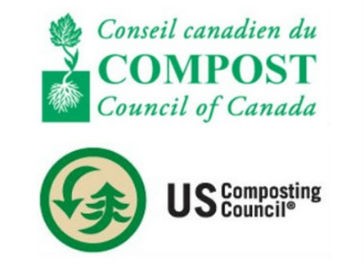International network of organics recycling advocates joins as one voice for Compost Awareness Week 2016
Organics Recycling and the Return of Compost to Soils Delivers Solutions to Climate Change, Food Security and Resource Management around the World

On the occasion of International Compost Awareness Week 2016 (May 1 - 7), a global network of organizations, devoted to organics recycling and compost use, are combining their efforts to bring attention to the multiple benefits that can be realized when organic residuals are viewed as resources rather than waste, including the role organics recycling can play in addressing a wide range of current global environmental issues.
European Compost Network, Composting & Anaerobic Digestion Association of Ireland, Australian Organics Recycling Association, The Compost Council of Canada, and the US Composting Council/Composting Council Research & Education Foundation will join with a common voice during International Compost Awareness Week 2016 to encourage the recycling of organic residuals and compost use worldwide as a key strategy for improved soil health and climate change mitigation.
While details vary amongst countries and continents, the following facts and benefits about organics recycling and compost use transcend political and cultural boundaries:
• The use of landfill space and incineration can be reduced by at least one-third when organics are recycled. Focused attention on recycling organic residuals is key to achieving high diversion rates.
• Methane, a greenhouse gas twenty-five times as powerful as carbon dioxide, can be significantly reduced by recycling organics instead of landfilling them.
• Soil health and productivity is dependent on organic matter, in the form of compost or humus, to provide the sustenance for the biological diversity in soil. Plants depend on this to convert materials into plant-available nutrients and to keep soil well-aerated. Additional benefits include the reduced need for pesticide usage to ward off soil-borne and other plant diseases.
• Soil erosion is mitigated and water-holding capacity improved through compost's enhancement of soil structure, which helps bind soil particles together. Without good soil structure, soil erosion can remove nutrients from the soil as well as carry sediments into waterways thereby creating new sources of pollution.
• Compost offers a significant answer to climate change mitigation. Compost's return to the soil serves as a "carbon bank", helping to store carbon thereby removing it from the atmosphere.
• Through organics recycling, quality soil can happen naturally. But it's based on one main equation: what you take out, you must put back in. The ongoing addition of organic matter and compost provides soil with the texture, structure and nutrients needed to create a positive environment for plant growth.
Throughout International Compost Awareness Week, community events will be held to encourage and celebrate organics recycling. All types of organics recycling will be promoted -- from "do it yourself" composting in your backyard, community gardens and community centres to large-scale community-wide composting and anaerobic digestion. The importance of the use of compost to bring Life back to the soils for strong, healthy plant growth, improved water quality and conservation will also be highlighted.
Visit www.compost.org or www.compostingcouncil.org for more information.
Company info
PO Box 19246
Raleigh, NC
US, 27619
Website:
compostingcouncil.org
Phone number:
301-897-2715



